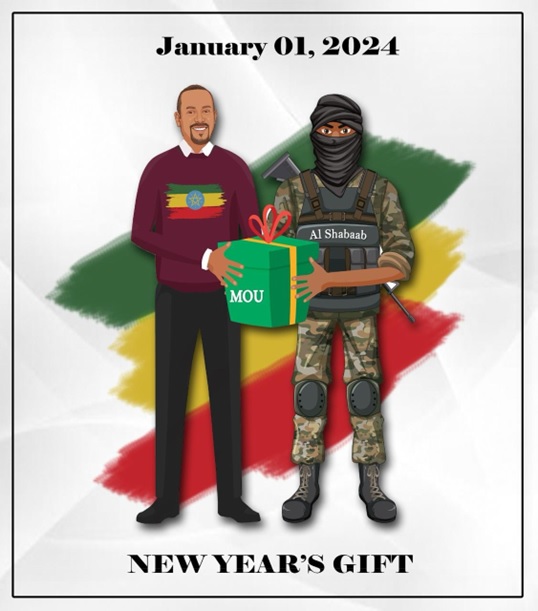REPERCUSSIONS OF ACRIMONY: AL SHABAAB RECEIVES NEW YEAR’S GIFT FROM ETHIOPIA, By Adam Aw Hirsi (PhD)

This brief concisely explores the numerous ways in which Al Shabaab will benefit – or has already benefited – from the recent exchange of barbs and rancorous diplomatic broadsides between Mogadishu and Addis Ababa, following the January 01, 2024 MoU that the Federal Government of Ethiopia signed with Somaliland, a territory both the world – including Ethiopia- and Somalia officially recognize as part and parcel of the Somali Federal Republic.
At the end of the brief, one will find the urgent need for de-escalation, wisdom and extreme necessity to move away from the brink, normalize relations, and seek to collectively close the door of opportunity to Al Shabaab and other terror groups in this region.
II: Mutual Destabilization
Until January 1st, 2024, when Ethiopian Prime Minister, Dr. Abiy Ahmed signed a Memorandum of Understanding with Muse Bihi, the leader of Somaliland region, granting Ethiopia 20 sq km of land on the Gulf of Aden well inside Somalia, Somalia and Ethiopia cooperated in the security sector like no other neighboring countries in the region. Ethiopian troops, operating outside of the African Union mandate, have stationed in Somalia, working hand in hand with the Somali National Security Forces and with no ill-feelings from the communities in which they served.
The cooperative spirit between the two countries was at its all-time high that on December 6th, 2023, the Ministers of Defence from both countries signed the renewal of a multidimensional MoU (security, policing, intel sharing, etc.) that the two countries have had for the last ten years.
III: Misinterpreting and Exploiting Social Division
Al Shabaab, like all other criminal outfits roaming the world, thrives in environments of social division and political polarization. The belligerent rhetoric between Somalia and Ethiopia has already created an atmosphere of mistrust and animosity, social and ethnic grievances, and rekindled perceptions of historical injustices that have been dormant in the quintessential Somali since Somalia under Siad Barre’s failed quest for Greater Somalia in the ’70s of the last century.
Exploiting those sentiments and grievances, Al Shabaab has already started to manipulate the situation and is primed to recruit Somali youth in the name of religion and Pan-Somalism. In other words, Al Shabaab will fully exploit all the existing or professed fault lines between the peoples in the region to fuel violence and promote their deadly extremist ideologies.
IV: Undermining Counterterrorism Efforts:
The absence of an optimum relationship between Somalia and Ethiopia, two countries joined at the hip in many ways, undermines the overall international counterterrorism efforts in the East Africa region. It will lay to waste the blood and treasure that many countries, Ethiopia being among the foremost, have sacrificed to make Somalia, the wider region and the world a safer place to live, raise children and do business.
Cooperative intelligence sharing, joint military operations, and coordinated military engagements against Al Shabaab will likely become increasingly difficult, if not impossible, to execute.
V: Conclusion:
In a region where soldiers from five countries, including Ethiopia, have been fighting a common enemy in Somalia, the breakdown of diplomacy between Somalia and Ethiopia will undoubtedly have severe negative repercussions on the overall security prospects of not only both Somalia and Ethiopia, but also for Kenya and Djibouti. This will give Al Shabaab a badly needed new breathing and operating space in the region. Buoyed by two of their archfoes having their propaganda – and potentially guns in no time – trained at each other, Al Shabaab terrorists will be able to expand their operations, presence, and relevance, posing a greater threat to both regional and global security.
To effectively respond to this situation and prevent any further escalations that will only benefit the terrorist organizations, realistic calculations are paramount. As Somalia does not have an square meter to maneuver on this issue, Ethiopia must skillfully walk back from the brink, disown the MoU it inked with Hargeisa and, when the time is right, start engaging for commercial maritime access with the Mogadishu-based national government where Somaliland region is duly represented.
Between now and then, every acrimonious day between Somalia and Ethiopia will only serve as an undeserved boon for Al Shabaab terror group. And that may spell doom for all of us.
Adam Aw Hirsi (PhD)




Very good analysis report. I agree with you my friend. Allshabaab has gained space and a breathing gap after the attentions of the Federal Government of Somalia is driven away by the Ethiopian government provocation on its land, sovereignty and territorial integrity.
ReplyDelete